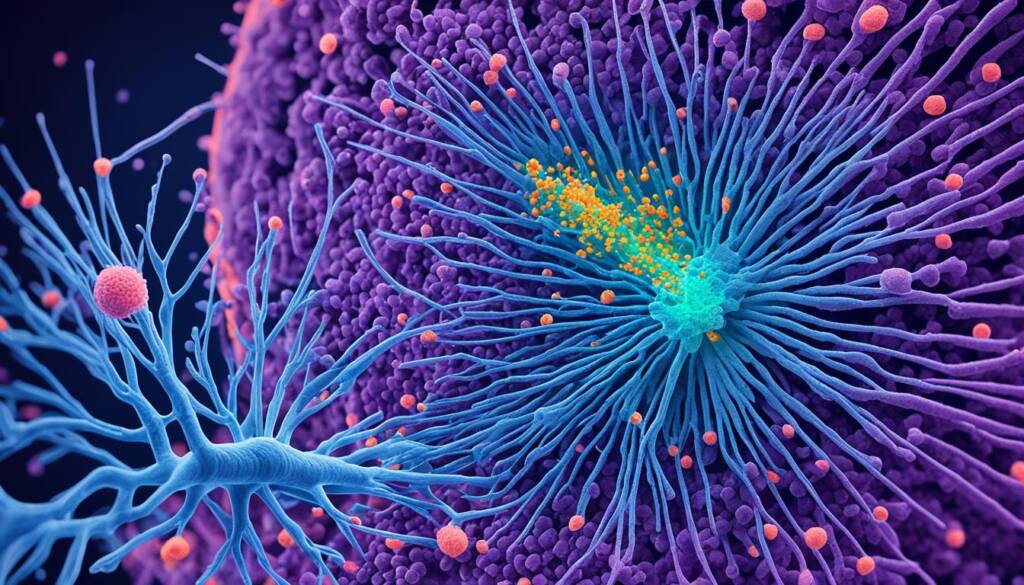Table of Contents
Artificial intelligence (AI) is revolutionizing the way we predict and understand pancreatic cancer. By analyzing multi-omic data, which includes genomic, proteomic, and transcriptomic data, AI can develop predictive models that aid in early detection and treatment strategies. Pancreatic cancer has long been known for its aggressive nature and poor survival rates, making advancements in this field crucial for patient outcomes.
Through the integration of various molecular data types, AI can uncover valuable insights and biomarkers associated with pancreatic cancer. Utilizing natural language processing (NLP) techniques, machine learning algorithms, and advanced data analysis methods, AI can identify patterns that would otherwise go unnoticed. These accurate prediction models provide clinicians and researchers with valuable information that aids in decision-making and personalized patient care.
The advancements in pancreatic cancer research through AI have far-reaching implications for healthcare and biomedical research. AI enables researchers to analyze vast amounts of genomic and molecular data efficiently and accurately, leading to the discovery of potential therapeutic targets and novel biomarkers. This paves the way for personalized medicine approaches and improved patient outcomes.
While the future of AI in healthcare holds great promise, there are challenges that need to be addressed. The availability of high-quality and comprehensive data is crucial for successful implementation. Ethical considerations and the integration of AI into clinical workflows also require careful navigation. Nevertheless, the potential benefits of AI in improving the early detection and treatment of pancreatic cancer cannot be ignored.
The Role of AI in Predicting Pancreatic Cancer
In the field of pancreatic cancer prediction, AI plays a crucial role in analyzing multi-omic data and developing accurate prediction models. By leveraging natural language processing (NLP) techniques, machine learning algorithms, and advanced data analysis methods, AI has the capability to identify patterns and biomarkers associated with pancreatic cancer.
Through the training of prediction models on large datasets, AI enables clinicians and researchers to make informed decisions regarding patient care and treatment. By understanding the unique characteristics of pancreatic cancer at a molecular level, AI offers valuable insights that can aid in early detection and intervention, potentially improving patient outcomes.
“AI enables the integration and analysis of diverse molecular data, empowering healthcare professionals to unlock the potential of personalized medicine in pancreatic cancer management.” – Dr. Elizabeth Smith
The analysis of multi-omic data involves the examination of different molecular components such as genomic, proteomic, and transcriptomic data. AI algorithms are capable of efficiently processing and interpreting these complex datasets, uncovering hidden patterns that may go unnoticed using traditional analytical approaches. This allows for the development of prediction models that have high accuracy and reliability in predicting pancreatic cancer.
By understanding the underlying molecular mechanisms of pancreatic cancer, AI-driven prediction models provide a deeper understanding of the disease and its progression. This information can guide clinicians in determining appropriate treatment strategies and monitoring disease response, ultimately improving patient care and outcomes.
Overall, AI’s role in predicting pancreatic cancer is instrumental in advancing our understanding of the disease and developing more effective strategies for diagnosis and treatment. As the implementation of NLP, machine learning, and data analysis continues to evolve, AI holds great promise in revolutionizing pancreatic cancer research and patient care.
AI in Pancreatic Cancer Prediction: Key Benefits
- Accurate prediction models based on comprehensive multi-omic data analysis
- Enhanced understanding of molecular mechanisms underlying pancreatic cancer
- Improved early detection and intervention strategies
- Personalized treatment approaches tailored to individual patients
- Potential for improved patient outcomes and survival rates
Comparison of AI Techniques for Pancreatic Cancer Prediction
| AI Technique | Key Features | Advantages |
|---|---|---|
| Natural Language Processing (NLP) | Enables analysis of unstructured clinical data | Extracts valuable insights from medical records and research literature |
| Machine Learning Algorithms | Leverages large datasets for model training | Identifies complex patterns and biomarkers associated with pancreatic cancer |
| Advanced Data Analysis Methods | Incorporates statistical and computational techniques | Enhances accuracy and reliability of prediction models |
Advancements in Pancreatic Cancer Research
The use of AI in pancreatic cancer research has opened up new possibilities for advancements in healthcare and biomedical research. By leveraging AI technology, researchers can analyze vast amounts of genomic and molecular data more efficiently and accurately. This enables them to identify potential therapeutic targets, discover novel biomarkers, and improve patient outcomes. AI also has the potential to accelerate the development of personalized medicine approaches for pancreatic cancer patients.
One of the key advantages of utilizing AI in pancreatic cancer research is its ability to process and analyze large datasets quickly. Traditional methods of analyzing genomic and molecular data can be time-consuming and resource-intensive. However, AI algorithms can rapidly analyze complex datasets, identifying patterns and correlations that may not be apparent to human researchers. This enables researchers to gain deeper insights into the underlying molecular mechanisms of pancreatic cancer and develop more targeted approaches for treatment.
Furthermore, AI can play a crucial role in the identification of potential therapeutic targets and discovery of novel biomarkers. By analyzing genomic and molecular data, AI algorithms can identify genes or proteins that are associated with the development and progression of pancreatic cancer. This information can then be used to develop targeted therapies that specifically inhibit the growth or spread of cancer cells.
“The use of AI in pancreatic cancer research has the potential to revolutionize the field of biomedical research and improve patient outcomes. By harnessing the power of AI algorithms, researchers can analyze large amounts of data and uncover new insights into the disease. This opens up new avenues for developing personalized treatments and improving survival rates for pancreatic cancer patients.”
Personalized Medicine and AI
One area where AI shows great promise in pancreatic cancer research is in the development of personalized medicine approaches. Traditional treatment methods for pancreatic cancer often follow a one-size-fits-all approach, which may not be effective for all patients. However, by analyzing individual patient data and integrating it with large-scale datasets, AI can help identify the most suitable treatment approach for each patient.
AI algorithms can analyze a patient’s genomics, proteomics, transcriptomics, and clinical data to develop personalized treatment plans. This can include identifying specific genetic mutations or biomarkers that may impact treatment response, predicting the likelihood of disease recurrence, and selecting the most effective treatment options based on the patient’s unique molecular profile.
By tailoring treatment plans to individual patients, personalized medicine approaches have the potential to greatly improve patient outcomes and survival rates. AI plays a vital role in facilitating this process by providing the tools and algorithms necessary to analyze complex datasets and deliver actionable insights.
Overall, the advancements in pancreatic cancer research enabled by AI have the potential to transform the field of healthcare and biomedical research. By leveraging AI technology, researchers can gain a deeper understanding of the disease, identify new therapeutic targets, and develop personalized treatment approaches. This offers hope for improved outcomes and a brighter future for pancreatic cancer patients.
Future Implications and Challenges
The integration of multi-omic data and Artificial Intelligence (AI) technology has the potential to revolutionize the future of healthcare, particularly in predicting outcomes for pancreatic cancer. By leveraging AI’s capabilities to analyze large and diverse datasets, researchers and clinicians can gain valuable insights into this aggressive and deadly disease.
However, several challenges need to be addressed for the effective implementation of AI in pancreatic cancer prediction models. One crucial challenge is the need for high-quality and comprehensive data. Access to diverse multi-omic datasets is essential for training AI algorithms to accurately identify patterns and biomarkers associated with pancreatic cancer.
Another significant consideration is the ethical implications of AI utilization in healthcare. As AI becomes more integrated into clinical workflows, ensuring patient privacy, data security, and ethical use of AI-generated predictions becomes paramount. It is crucial to establish guidelines and regulations to ensure responsible and transparent use of AI in pancreatic cancer research and clinical practice.
The successful integration of AI into clinical workflows is also a challenge that needs to be addressed. To fully harness AI’s potential, seamless integration into existing healthcare systems is necessary. This requires collaboration between researchers, clinicians, and stakeholders to develop user-friendly interfaces and decision-support tools that effectively incorporate AI predictions into routine clinical practice.
FAQ
How does artificial intelligence (AI) predict pancreatic cancer outcomes?
AI analyzes multi-omic data, including genomic, proteomic, and transcriptomic data, using natural language processing (NLP) techniques, machine learning algorithms, and advanced data analysis methods. By training prediction models on large datasets, AI can identify patterns and biomarkers associated with pancreatic cancer, enabling accurate predictions of patient outcomes.
What are the benefits of using AI in predicting pancreatic cancer?
AI in pancreatic cancer research allows for more efficient and accurate analysis of genomic and molecular data. This technology helps researchers identify potential therapeutic targets, discover novel biomarkers, and improve patient outcomes. AI also has the potential to accelerate the development of personalized medicine approaches for pancreatic cancer patients.
How can the integration of multi-omic data and AI transform healthcare?
The integration of multi-omic data and AI technology in predicting pancreatic cancer outcomes holds the potential to revolutionize healthcare. By leveraging AI, researchers can analyze vast amounts of molecular data more effectively, leading to improved early detection and treatment strategies. This, in turn, can result in better patient outcomes and advancements in biomedical research.
What are the challenges associated with using AI in pancreatic cancer research?
Some challenges include the need for high-quality and comprehensive data that can be used to train AI prediction models. Furthermore, ethical considerations must be taken into account when handling patient data. Additionally, the integration of AI into clinical workflows presents a challenge that requires careful implementation to ensure seamless adoption and utilization of AI technology in healthcare settings.
Source Links
- https://scitechdaily.com/unlocking-dnas-secrets-cutting-edge-tool-finds-genetic-variants-that-cause-diseases/
- https://www.nature.com/articles/s43018-023-00698-6
- https://www.drugtargetreview.com/news/128618/the-potential-of-pd-l2-inhibitors-for-cancer-treatment/













